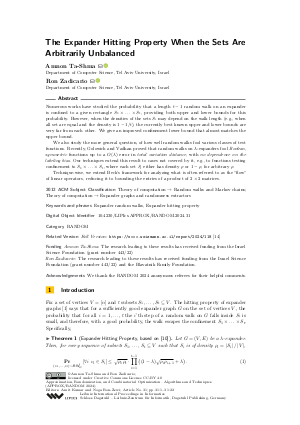The Expander Hitting Property When the Sets Are Arbitrarily Unbalanced
Authors
Amnon Ta-Shma  ,
Ron Zadicario
,
Ron Zadicario 
-
Part of:
Volume:
Approximation, Randomization, and Combinatorial Optimization. Algorithms and Techniques (APPROX/RANDOM 2024)
Part of: Series: Leibniz International Proceedings in Informatics (LIPIcs)
Part of: Conference: International Conference on Approximation Algorithms for Combinatorial Optimization Problems (APPROX)
Part of: Conference: International Conference on Randomization and Computation (RANDOM) - License:
 Creative Commons Attribution 4.0 International license
Creative Commons Attribution 4.0 International license
- Publication Date: 2024-09-16
File

PDF
LIPIcs.APPROX-RANDOM.2024.31.pdf
- Filesize: 0.79 MB
- 22 pages
Document Identifiers
Related Versions
- Full Version https://eccc.weizmann.ac.il/report/2024/118
Subject Classification
ACM Subject Classification
- Theory of computation → Random walks and Markov chains
- Theory of computation → Expander graphs and randomness extractors
Keywords
- Expander random walks
- Expander hitting property
Metrics
- Access Statistics
-
Total Accesses (updated on a weekly basis)
0PDF Downloads0Metadata Views
Abstract
Numerous works have studied the probability that a length t-1 random walk on an expander is confined to a given rectangle S_1 × … × S_t, providing both upper and lower bounds for this probability. However, when the densities of the sets S_i may depend on the walk length (e.g., when all set are equal and the density is 1-1/t), the currently best known upper and lower bounds are very far from each other. We give an improved confinement lower bound that almost matches the upper bound. We also study the more general question, of how well random walks fool various classes of test functions. Recently, Golowich and Vadhan proved that random walks on λ-expanders fool Boolean, symmetric functions up to a O(λ) error in total variation distance, with no dependence on the labeling bias. Our techniques extend this result to cases not covered by it, e.g., to functions testing confinement to S_1 × … × S_t, where each set S_i either has density ρ or 1-ρ, for arbitrary ρ. Technique-wise, we extend Beck’s framework for analyzing what is often referred to as the "flow" of linear operators, reducing it to bounding the entries of a product of 2×2 matrices.
Cite As Get BibTex
Amnon Ta-Shma and Ron Zadicario. The Expander Hitting Property When the Sets Are Arbitrarily Unbalanced. In Approximation, Randomization, and Combinatorial Optimization. Algorithms and Techniques (APPROX/RANDOM 2024). Leibniz International Proceedings in Informatics (LIPIcs), Volume 317, pp. 31:1-31:22, Schloss Dagstuhl – Leibniz-Zentrum für Informatik (2024)
https://doi.org/10.4230/LIPIcs.APPROX/RANDOM.2024.31
BibTex
@InProceedings{tashma_et_al:LIPIcs.APPROX/RANDOM.2024.31,
author = {Ta-Shma, Amnon and Zadicario, Ron},
title = {{The Expander Hitting Property When the Sets Are Arbitrarily Unbalanced}},
booktitle = {Approximation, Randomization, and Combinatorial Optimization. Algorithms and Techniques (APPROX/RANDOM 2024)},
pages = {31:1--31:22},
series = {Leibniz International Proceedings in Informatics (LIPIcs)},
ISBN = {978-3-95977-348-5},
ISSN = {1868-8969},
year = {2024},
volume = {317},
editor = {Kumar, Amit and Ron-Zewi, Noga},
publisher = {Schloss Dagstuhl -- Leibniz-Zentrum f{\"u}r Informatik},
address = {Dagstuhl, Germany},
URL = {https://drops.dagstuhl.de/entities/document/10.4230/LIPIcs.APPROX/RANDOM.2024.31},
URN = {urn:nbn:de:0030-drops-210246},
doi = {10.4230/LIPIcs.APPROX/RANDOM.2024.31},
annote = {Keywords: Expander random walks, Expander hitting property}
}
Author Details
Funding
- Ta-Shma, Amnon: The research leading to these results has received funding from the Israel Science Foundation (grant number 443/22)
- Zadicario, Ron: The research leading to these results has received funding from the Israel Science Foundation (grant number 443/22) and the Blavatnik Family Foundation.
Acknowledgements
We thank the RANDOM 2024 anonymous referees for their helpful comments.
References
-
Miklós Ajtai, János Komlós, and Endre Szemerédi. Deterministic simulation in logspace. In Proceedings of the nineteenth annual ACM symposium on Theory of computing, pages 132-140, 1987.

-
Noga Alon, Uriel Feige, Avi Wigderson, and David Zuckerman. Derandomized graph products. Computational Complexity, 5:60-75, 1995.

- C. Beck. Chernoff bounds for expander walks. https://www.ias.edu/video/csdm/2015/0310-ChristopherBeck, 2015. A recording of a lecture, given at the Institute for Advanced Study, Princeton, USA.
-
Gil Cohen, Dor Minzer, Shir Peleg, Aaron Potechin, and Amnon Ta-Shma. Expander random walks: The general case and limitations. In 49th International Colloquium on Automata, Languages, and Programming (ICALP 2022). Schloss Dagstuhl - Leibniz-Zentrum für Informatik, 2022.

-
Gil Cohen, Noam Peri, and Amnon Ta-Shma. Expander random walks: A fourier-analytic approach. In Proceedings of the 53rd Annual ACM SIGACT Symposium on Theory of Computing, pages 1643-1655, 2021.

-
David Gillman. A chernoff bound for random walks on expander graphs. SIAM Journal on Computing, 27(4):1203-1220, 1998.

-
Oded Goldreich. Three XOR-lemmas - An exposition. Studies in Complexity and Cryptography. Miscellanea on the Interplay between Randomness and Computation: In Collaboration with Lidor Avigad, Mihir Bellare, Zvika Brakerski, Shafi Goldwasser, Shai Halevi, Tali Kaufman, Leonid Levin, Noam Nisan, Dana Ron, Madhu Sudan, Luca Trevisan, Salil Vadhan, Avi Wigderson, David Zuckerman, pages 248-272, 2011.

-
Louis Golowich and Salil Vadhan. Pseudorandomness of expander random walks for symmetric functions and permutation branching programs. In 37th Computational Complexity Conference (CCC 2022). Schloss Dagstuhl - Leibniz-Zentrum für Informatik, 2022.

-
Alexander D Healy. Randomness-efficient sampling within nc. Computational Complexity, 17:3-37, 2008.

-
Shlomo Hoory, Nathan Linial, and Avi Wigderson. Expander graphs and their applications. Bulletin of the American Mathematical Society, 43(4):439-561, 2006.

- Akhil Jalan and Dana Moshkovitz. Near-optimal cayley expanders for abelian groups. arXiv preprint, 2021. URL: https://arxiv.org/abs/2105.01149.
-
Fernando Granha Jeronimo, Shashank Srivastava, and Madhur Tulsiani. Near-linear time decoding of ta-shma’s codes via splittable regularity. In Proceedings of the 53rd Annual ACM SIGACT Symposium on Theory of Computing, pages 1527-1536, 2021.

-
Amnon Ta-Shma. Explicit, almost optimal, epsilon-balanced codes. In Proceedings of the 49th Annual ACM SIGACT Symposium on Theory of Computing, pages 238-251, 2017.

- Amnon Ta-Shma and Ron Zadiario. The expander hitting property when the sets are arbitrarily unbalanced. Electronic Colloquium on Computational Complexity (ECCC), TR24-118, 2024. URL: https://eccc.weizmann.ac.il/report/2024/118.
-
Salil P Vadhan et al. Pseudorandomness. Foundations and Trendsregistered in Theoretical Computer Science, 7(1-3):1-336, 2012.

